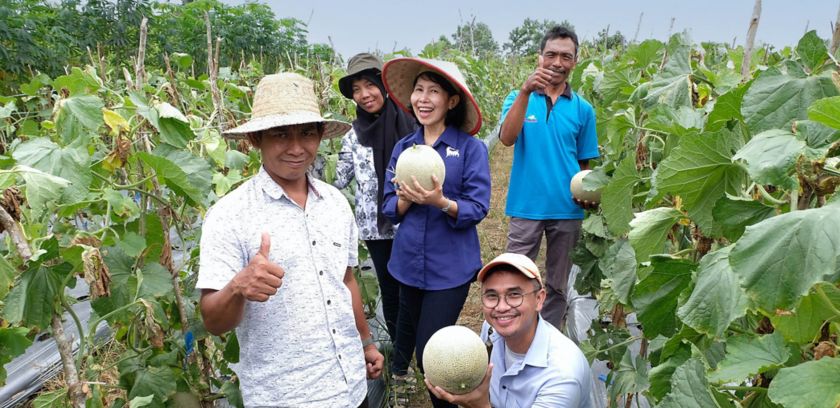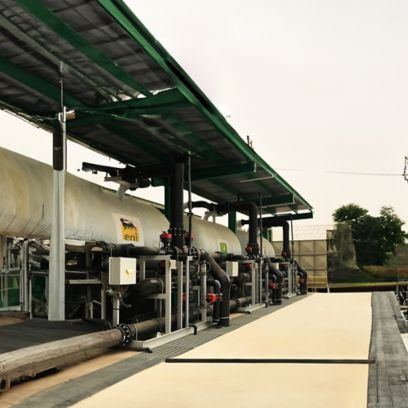
Water conservation on our path to Net Zero
Contributing to the preservation of water resources is a fundamental part of our sustainability goals. Our efforts in this area begin by defining a series of actions to monitor and counter the effects of climate change such as water scarcity and desertification, giving priority to operational sites in water-stressed areas.
We also undertake initiatives to reduce freshwater withdrawals and replace them with water from secondary sources (rainwater, reclaimed groundwater, treated wastewater or desalinated water) in order to reduce impacts on local communities and ecosystems.
The publication of Eni’s position on water is a further concrete step towards strengthening the commitments of the CEO Water Mandate in line with the United Nations Sustainable Development Goals. Transparency in the pursuit of these objectives supports all our actions and we apply this principle at every level and to any business adhering to the main Environmental, Social and Governance (ESG) indices.
Eni’s water commitments
All data on our sustainability performance
The results we obtain in the areas of sustainability available in the form of graphs and tables.

Our commitment to defending water around the world
The defence of water is a global goal supported by the most important international institutions. We wanted to make our commitment concrete and transparent by voluntarily aligning ourselves with global standards.
Eni was the first company in the energy sector to join the UN Global Compact’s CEO Water Mandate, a UN initiative supported by more than 242 companies from different sectors. Its goal is to encourage companies to take concrete steps towards the sustainable use of water in industrial processes. Members commit to improving corporate performance in six specific areas (Direct Operations, Supply Chain & Watershed Management, Collective Action, Public Policy and Community Engagement), annually reporting on progress. Contributing to water security and the sustainable development goals is one of the mandate’s core missions.
We apply the principle of transparency at every level and for every business, adhering to the main ESG indices to this end. In 2023, we achieved a score of B in the CDP Water Security questionnaire for transparency on water management, above the industry average. CDP is a non-profit organisation that assesses the performance and strategies of listed companies on climate, water resources and the sustainability of biomass used in production processes. The score steers companies towards reducing environmental impacts and protecting water resources and forests, encourages them to capitalise on opportunities, and guides the actions of investors and customers towards a more sustainable world.
Universal access to clean water is an essential aspect of the world we want to live in, as stated in Goal 6 of the United Nations 2030 Agenda. On the same theme, Goal 14 aims to protect marine and coastal ecosystems by reducing sea contamination and ocean acidification. Finally, Goal 15 aims to conserve, restore and promote the sustainable use of terrestrial freshwater ecosystems and their services, especially forests, wetlands, mountains and drylands, contributing to the goal of conserving water resources.
Our commitment to defending water around the world
The defence of water is a global goal supported by the most important international institutions. We wanted to make our commitment concrete and transparent by voluntarily aligning ourselves with global standards.
Eni was the first company in the energy sector to join the UN Global Compact’s CEO Water Mandate, a UN initiative supported by more than 242 companies from different sectors. Its goal is to encourage companies to take concrete steps towards the sustainable use of water in industrial processes. Members commit to improving corporate performance in six specific areas (Direct Operations, Supply Chain & Watershed Management, Collective Action, Public Policy and Community Engagement), annually reporting on progress. Contributing to water security and the sustainable development goals is one of the mandate’s core missions.
We apply the principle of transparency at every level and for every business, adhering to the main ESG indices to this end. In 2023, we achieved a score of B in the CDP Water Security questionnaire for transparency on water management, above the industry average. CDP is a non-profit organisation that assesses the performance and strategies of listed companies on climate, water resources and the sustainability of biomass used in production processes. The score steers companies towards reducing environmental impacts and protecting water resources and forests, encourages them to capitalise on opportunities, and guides the actions of investors and customers towards a more sustainable world.
Universal access to clean water is an essential aspect of the world we want to live in, as stated in Goal 6 of the United Nations 2030 Agenda. On the same theme, Goal 14 aims to protect marine and coastal ecosystems by reducing sea contamination and ocean acidification. Finally, Goal 15 aims to conserve, restore and promote the sustainable use of terrestrial freshwater ecosystems and their services, especially forests, wetlands, mountains and drylands, contributing to the goal of conserving water resources.
Our actions to protect biodiversity
We work to minimise risks and maximise efforts to protect and conserve marine and terrestrial ecosystems.

Efficient and integrated water resource management
Eni seeks to safeguard water resources and reduce freshwater withdrawals through efficient and integrated management of water required for operations.
We prioritise water-stressed areas and through the reuse of low-quality wastewater (from domestic/industrial activities), we reduce high-quality withdrawals at:
- the Livorno refinery, one of the main Italian sites exposed to water stress. The installation and testing of the new demineralized water production plant serving the refinery was completed in December 2022. The project involved treating and reusing refinery wastewater and allowing for a reduction in fresh water withdrawals of 0.4 Mm³/l year, (the equivalent to a saving of approximately 10% of the site's fresh surface water withdrawals).
- the Ravenna petrochemical hub, with its wastewater reuse plant, which will be in operation from 2025 (approximately 0.8 Mm3 of the site's fresh surface water withdrawals)
- the Brindisi petrochemical hub, with its plant to reuse about 0.4 Mm³ per year of wastewater, which will be in operation from 2026
- the Gela biorefinery, where Eni treated around 3.9 Mm³ of urban waste water in 2023 and reused 0.4 Mm³ of it for industrial purposes.
We are committed to exploiting water from reclamation activities through processes that enable its reuse for industrial purposes. One example is the Eni Rewind initiatives at the Porto Torres, Priolo, Assemini, Manfredonia and Gela sites, where contaminated groundwater is used to produce demineralized water, minimising freshwater withdrawals.
Suitably treated reclaimed water is used, for example, at:
- the petrochemical plant in Porto Torres (for 1/3 of the site's freshwater needs)
- the Gela biorefinery, where about 50% of the water demand was met by low quality water (waste water and reclaimed water).
Further studies are underway to increase the reuse of reclaimed water and wastewater at the Porto Torres, Priolo and Mantua industrial sites.
Production water refers to water naturally present in the field and associated with the extraction of hydrocarbons, which may contain contaminants (oils, heavy metals or other harmful compounds). We are committed to treating and reusing production water in this respect. Here are some examples:
- the Viggiano Blue Water project in the Agri Valley in Basilicata for industrial use
- the Meleiha site in Egypt for production purposes
- the Burun site in Turkmenistan for production purposes.
One of the levers to reduce freshwater withdrawals is to replace them with desalinated water. Desalinated water is fresh water obtained through the desalination process, which involves removing salt and impurities from seawater or other high-salinity sources.
For example, the use of desalinators in Egypt has made it possible to:
- eliminate freshwater withdrawals at the Zohr site
- reduce freshwater withdrawals by 80% at the Abu Rudeis site.
With Eni Rewind for water resource management
Regeneration and reuse of water are central to the mission of Eni’s environmental company, which carries out groundwater remediation through the use of increasingly innovative technological solutions
Research on sustainable water management with CNR Metaponto
The Eni-CNR “Ipazia D’Alessandria” Centre in Metaponto, Basilicata, aims to promote innovative solutions and technologies for the efficiency and optimization of water management in farming in order to mitigate the impacts of drought in Mediterranean countries and other strategic areas such as the Horn of Africa, Sahel, and the Middle East.
The activities are part of the sustainability and the circularity strategies of urban wastewater treatment cycle. Wastewater management represents a significant economic and environmental cost, but it can also turn into a potential economic development opportunity. In fact, recovering and utilizing the vast quantities of water discharged by sewage treatment plants can not only help mitigate the recurring water crises that afflict the agricultural world, but can give concrete development to new supply chains in the bio-agri energy sector.
There are three research themes that the joint centre's activities are based upon:
- optimising the use of water in farming both through innovative irrigation systems that reduce water use and through the efficient absorption of water by plants through the study of bacteria and fungi naturally present in the root system of plants. Further to this, selecting plant genotypes with higher growth capacity in different environments by means of advanced high-throughput automated field phenotyping platforms;
- developing new technologies for the treatment of civil and industrial wastewater with the possibility of reusing treated water in agriculture (experimental). This can play a role in climate change mitigation by reducing the emission of greenhouse gases while contributing to the sequestration of the C in the soil. Wastewater is also often the most available resource in many arid areas, with constant flow rates throughout the year and few areas of use.
- optimally managing coastal groundwater, mitigating on the one hand the risk of salt wedge intrusion, which progressively leads to a salinisation of the groundwater with a decrease in the volume of available fresh groundwater, and on the other hand the risk of subsidence.
The first line of activity, which specifically studied the response of selected crops to water stress, involved conducting field campaigns in which crops were subjected to different irrigation regimes; these were lower compared to theoretical requirements. The physiological and agronomic responses of the tested genotypes are periodically studied, including by means of digital instrumentation installed on a fleet of drones, to assess the effects of reduced water supply.
In addition, the bacterial consortia naturally present in the soil and root system are analysed in order to identify strains with promoting characteristics by laboratory analysis on samples taken in the field that can be used as biostimulants (PGPR) in subsequent campaigns Since the start of the project, four test campaigns have been conducted, two of them with oilseed crops, the results of which will help define optimal water resource management practices.
The second project involves creating innovative prototypes to treat civil wastewater with the aim of reusing the treated water for agricultural irrigation. The prototypes will be located at the water purification plant in the municipality of Ferrandina, and will complement the one built by the School of Engineering of the University of Basilicata (a partner of the Ipazia d'Alessandria Centre), which is already in operation at the Ferrandina purification plant. Once the experimental treatment plant is up and running, the continuation of activities will consist of irrigating oil crops to compare the effects of irrigation with purified wastewater versus irrigation with spring water.
On the other hand, the third project underway at the Research Centre involves numerically modelling coastal aquifers with the aim of simulating their behaviour under varying environmental conditions and flow rates, mainly for irrigation purposes. The main objective is to create a management tool for the groundwater resource that allows its proper use and avoids the risks of salt wedge intrusion and subsidence that could be generated as a result of excessive pumping. The study area is the north-eastern section of the Metaponto plain. The modelling is supplemented with results from sampling campaigns carried out in the study area.
Our water access projects
Eni has always combined its energy activities with the promotion of initiatives to benefit communities. Our value creation drivers include alliances for the promotion of local development in the countries where we operate. Indeed, we are not only committed to enhancing the resources of producer countries, allocating their gas production to the local market and facilitating access to electricity, but also to promoting a broad portfolio of community-based initiatives: water access initiatives are an important part of this commitment.
Access to water: a priority in our work
Eni for 2023. Browse the interactive feature
Discover the sustainability report that brings together our goals, commitments and achievements for a socially just energy transition.

We support fair and sustainable access to energy in a transparent way
We promote respect for the environment and fair and sustainable access to energy. We take a responsible approach and make our performance data public.





























